
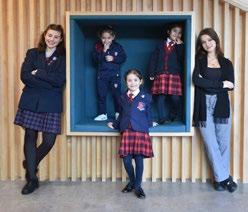
Issue 27 March/April 2023 Familiesonline.co.uk Easter Education What’s On FREETakeMeHome IN THIS ISSUE Dorset Independent School for Girls aged 3-18 Talbot Heath Discover more, book a Head’s Talk & Tour online, a warm welcome always awaits THINK THROUGH Talbot Heath Junior pupils are now guaranteed a highly sought after place in our Senior Schoolsee our admissions policy online for criteria Now that is reassuring. Talbot Woods | Bournemouth | Tel: 01202 763360 | talbotheath.org | Day and boarding | New! Honeybees Family & Toddler Group 0-4
Easter Event Easter Event






The ‘Bandit Bunnies’ are on the loose! These cheeky characters have plotted to capture the Easter Bunny and steal their chocolate eggs! We need your help to save the Easter Bunny by soaking them with water pistols!









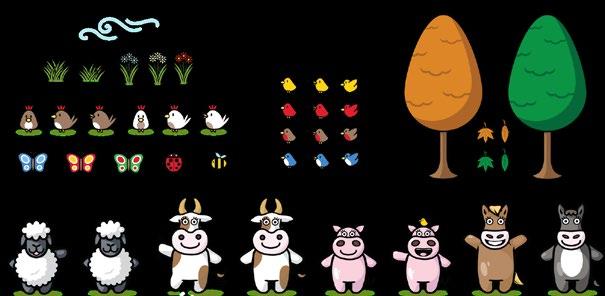


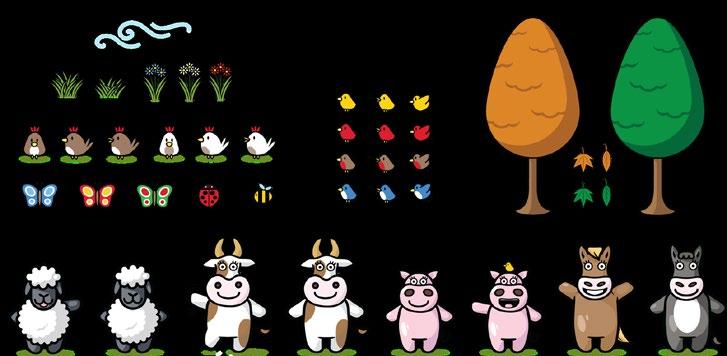

EGG HUNT EGG HUNT











It wouldn’t be Easter at Farmer Palmer’s without our famous Easter Egg Hunts! 100’s of mini chocolate eggs will be scattered in our special egghunting field




Look out for a GOLDEN TICKET! There are 25 to find each day and these can be exchanged for a BIG chocolate egg in the Gift Shop.



WHAT’S ON Meet & Hold a Guin Hands on Goat Feed Pony Grooming Deer Safa i* Timetab Timetab www.farmerpalmers.co.uk www.farmerpalmers.co.uk email: email: shop@farmerpalmers.co.uk shop@farmerpalmers.co.uk call: call: 01202 622022 01202 622022 Wareham Road, Organford, Poole, BH16 6EU Wareham Road, Poole, BH16 6EU B o o k n o w ! B o o k n o w ! @farmerpalmersfarmpark @farmerpalmersfarmpark
Pedal Karts Pedal Karts
Contact us
Editor Linda Stone editor@familiesdorset.co.uk
020 8241 0423
Sales Claire Clarricoates
claire.clarricoates@familiespublishing.co.uk
01494 689098/ 07812 218331
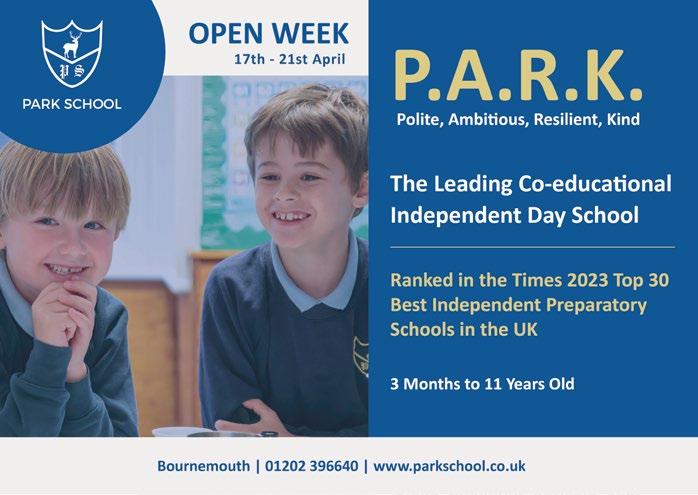
Printed by Buxton Press
Design Rebecca Carr
This product is made of material from well-managed, FSC®-certified forests and other controlled sources.
November/December competition winners
Congratulations to all our winners. You can find a list at https://bit.ly/NOrecipients
Families is a registered trademark of LCMB Ltd, Remenham House, Regatta Place, Marlow Road, Bourne End, Bucks SL8 5TD. The contents of this magazine are fully protected by copyright and none of the editorial or photographic matter may be reproduced in any form without prior consent of Families Print Ltd. Every care is taken in the preparation of this magazine but Families Print Ltd, its distributors, franchisees and LCMB Ltd cannot be held responsible for the claims of advertisers nor for the accuracy of the contents, or any consequences thereof.
Welcome
The seasons are turning and spring is just around the corner. So it’s time to stop hibernating and re-embrace the big outdoors! You’ll find plenty of opportunities to get out and about locally if you take a look at our What’s On guide. And it’s not too soon to start planning Easter egg hunts!
Do you remember when you were young, all those blissful and adventure-filled days playing in the local neighbourhood with the other children that lived nearby? We have some interesting information on how you can offer your kids the freedom of ‘playing out’ that these days is much harder to come by.
Also in this issue, we have Smoby Nature Playhouses to giveaway and you can apply inside. By doing so, you’ll also ensure you receive our digital magazine with lots more content and goodies on offer.
Editor, Families Dorset
Familiesonline.co.uk Families Dorset 3
CONTENTS
this issue Easter days out What’s On Education Parenting Early years Easter crafts 4. 10 12. 15. 15. 16.
In
Linda
Book now to include your business in our next issue Call Claire on 07812 218331
Easter family fun at Monkey World
From 1 to 16 April, enjoy Easter fun at Monkey World in Wareham including a FREE activity sheet for kids! Kids can complete the fun activity sheet during their visit to the park and collect a sticker as a prize.
Families matter at Monkey World and, as well as two hundred and sixty rescued and endangered apes and monkeys, they can make the most of three play areas and a woodland walk.

The kids activity centre will also be running primate arts and crafts, so as well as learning about our closest relatives, your little monkeys can also make an enrichment feeder for the primates living at Monkey World.
From 7 to 10 April, there’s a FREE Easter Egg Trail for kids around the park. Find all the clues to lead to a tasty chocolate treat (while stocks last!)
Book online at www.monkeyworld.org/events to receive an extra 10% off gate prices and pick up your activity sheet at the entrance gate.
Farmer Palmer’s helps kids’ movement skills
Did you know that a day out at Farmer Palmer’s Farm Park is packed with opportunities for fun-filled play which assist the development of important movement skills in young children?
To celebrate this, Farmer Palmer’s, in Organford, Poole and the Bournemouth-based Storycises, have joined forces to create a book called I Love Visiting My Favourite Farm Park!
The collaboration came about after Wendy Joy and Jane Reynolds, both Paediatric Chartered Physiotherapists, met with Sandra Palmer-Snellin at Farmer Palmer’s and spoke about their work helping children to gain essential motor skills. They were able to link crucial motor skills practice to the various areas of Farmer Palmer’s and show the importance of the physical experiences it offers.
The colourful book shows how to integrate essential foundation movement skills through play, practice, learning and experiences available at Farmer Palmer’s, helping children to prepare for school and beyond.
Copies of I Love Visiting My Favourite Farm Park! are available in-store and online at www.farmerpalmers.co.uk
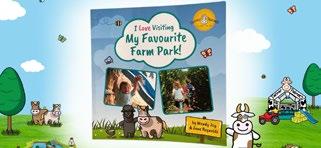
A family experience at Golden Gecko
At Golden Gecko Climbing in Romsey, climbing isn’t just an activity – it’s a shared experience and ideal for families this Easter.
The team at Golden Gecko prides itself on encouraging climbers of all ages and levels of experience to reach new heights and enjoy everything the centre has to offer.
With 190m2 of climbing available on the Climbing Tower and Challenge Wall, children will never be bored. What’s more, any child ages 5+ can join in, with or without climbing experience. For those that do have experience, bouldering is also available.

With more than seventy routes and easy access to roped climbing, safety is taken care of with seventeen easy auto belay devices which lower the climber to the ground at a controlled rate and act as a safety check if they fall. Golden Gecko also offers a range of instructed sessions for both kids and adults.
For more info, visit www.ggclimbing.com
Family
adventures at Avon Tyrrell Outdoor Centre
Avon Tyrrell Outdoor Centre’s family Go Adventure Activities in the New Forest National Park, are the perfect opportunity to try an activity and experience the great outdoors.
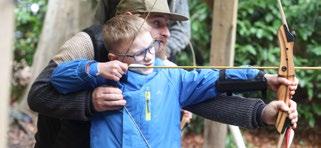
Costing just £14 per person for a ninety-minute activity, it’s the ideal environment in which to experience learning outside of school. There are lots of FREE activities too!
Why not make it a staycation - book activities AND stay in nature!
More info at www.avontyrrell.org.uk, call 01425 672347 or email info@ukyouth.org
Familiesonline.co.uk Families Dorset 4 DAYS OUT
Follow us



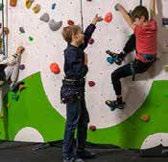
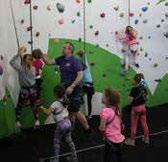






Familiesonline.co.uk Families Dorset 5 www.wimborne-modeltown.com 1 April - 29 October Every day 10am-5pm Fun for all ages with many indoor & outdoor attractions! www.ggclimbing.com INDOOR BOULDERING & CLIMBING CENTRE Mon-Fri 10am-10pm Sat 10am-6pm Sun 12noon-6pm. 34 Romsey Industrial Estate, Greatbridge Road, Romsey, SO51 0HR 01794 590022 I info@ggclimbing.com To book an advert in our next issue call Claire on 07812 218331
What’s on
All listings are correct at the time of publication. Please check with the venue before you visit in case anything has changed.
Daily until 26 Mar
Dinosaurs in Weymouth
Dinosaur trail throughout the town, featuring three life size dinosaurs. www.weareweymouth.co.uk/ dinosaurs-are-back
Every Fri until 31 Mar
Parent & Toddler Group at Careys Secret Garden
An activity related to a story/ theme to encourage exploring the woodland. Includes FREE play. www.careyssecretgarden.co.uk
Every Thu in Mar & 20 Apr Roots and Shoots at Upton Country Park
Grandparent-friendly tots sessions with storytelling, crafts and exploration in gardens. www.uptoncountrypark.com
Every Fri during term time Puddle Jumpers Club Forest School at Upton Country Park Outdoor activity sessions for preschoolers and parents. www.uptoncountrypark.com
Every Sat & Sun Regent Kid’s Club at Regent Theatre Christchurch
Best kids and family films every weekend morning. £3.50 kids & adults. Check website for listings. www.theregent.co.uk/whatson/ kidsclub

Fri 10 Mar, Sat 25 Mar & 14 Apr Stargazing at Durlston Country Park
Join the Wessex Astronomical Society to use telescopes to view the stars and planets. www.durlston.co.uk
Sat 11 Mar
Lab Kitchen at Swanage Library
Come and learn about fun science you can do in your own home. FREE.
www.bit.ly/DorsetLibraryEvents
Sun 12 Mar
Family Science Day at Dorset Museum
Meet a real scientist and get involved in hands-on learning and experiments Ages 4+, FREE. www.dorsetmuseum.org
Exotic Animal Handling at Corn Exchange
Amazingly fun, educational and interactive sessions, FREE. www.dorsetmuseum.org
The Magic of Science at Corn Exchange Non-stop, action-packed, interactive magical science experiments. www.dorchesterarts.org.uk
Thu 16 Mar
Lab Kitchen at Swanage Library Come and learn about fun science
you can do in your own home. FREE. www.bit.ly/DorsetLibraryEvents
An Investigation in the Library at Gillingham Library
Join a forensic investigation involving fingerprints, DNA and other investigations. www.bit.ly/DorsetLibraryEvents
Science Bits and Bytes at Ferndown Library
Celebrate British Science Week with fun experiments and activities. Ages 6-10 years. FREE. www.bit.ly/DorsetLibraryEvents
UK Space Agency at Dorchester Library
Learn all about the UK’s first orbital launch attempt. www.bit.ly/DorsetLibraryEvents
Wed 15 Mar
Nature Tots at Kingcombe Visitor Centre
For parents/guardians to bring children ages 4 and under to experience the wildlife of Kingcombe. www.dorsetwildlifetrust.org.uk
Sat 18 Mar
Mother’s Day Craft Activity at Shaftesbury Library
Creative Mother’s Day craft drop in event, FREE. www.bit.ly/DorsetLibraryEvents
Sun 19 Mar
Science Day at Nothe Fort Fun and immersive Science Day, full of experiments and activities for the family to enjoy. www.nothefort.org.uk
Mother’s Day at Monkey World Ape Rescue Centre
Mums get 50% off entry for a great day of ape fun, book online for extra 10% off gate prices. www.monkeyworld.org

Mother’s Day at Farmer Palmers Farm Park
Half-price tickets for all mums and special cream teas. www.farmerpalmers.co.uk
Mother’s Day Paddle to the Pub in Beaulieu
Treat Mum to a wonderful paddle to the pub on the Beaulieu River with New Forest Activities. www.newforestactivities.co.uk
Mother’s Day at Seaton Tramway
Fantastic day out for everyone this Mother’s Day. Mum travels FREE. www.tram.co.uk
Fri 24 Mar to Sun 26 Mar
Spring Steam Gala at Swanage Railway
Three-day spectacular will see the best of Scottish and Southern motive power.
www.swanagerailway.co.uk
Sat 25 Mar
Mad About the Bard at Swanage Library
Learn about Shakespeare with stories, songs and craft activities. All ages. FREE.
www.bit.ly/DorsetLibraryEvents

Sat 25 Mar & Sat 22 Apr Fox & Cubs Club at Upton Country Park Sessions designed for dads and kids to spend quality time together in the great outdoors.

www.uptoncountrypark.com
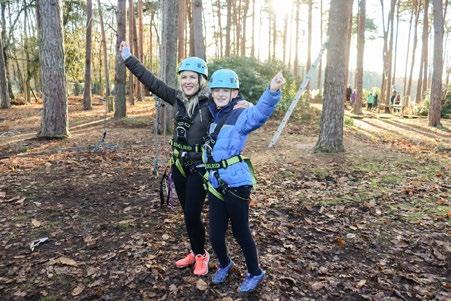
Familiesonline.co.uk Families Dorset 6
Family events Adventure activities Bike hire & tracks Lodges & camping Self guided activities Join us for a family adventure avontyrrell org uk | 01425 672347 | info@ukyouth org New Forest National Park
WHAT’S ON
EASTER HOLIDAYS


Sat 25 Mar to Wed 19 Apr
Bonker Bunnies Easter Trail at Durlston Country Park Hop on up and find all the Bonkers Bunnies around the park. £3 per prize trail pack. www.durlston.co.uk
Sat 1 Apr to Mon 10 Apr
Easter Fun at Monkey World Kids can complete free activity sheet with prize as well as well as 260 rescued and endangered apes and monkeys, three play areas and a woodland walk on offer. www.monkeyworld.org
Canoe Easter Egg Hunt at Beaulieu
Two hour guided canoe tour on the hunt for Easter eggs. www.newforestactivities.co.uk
Easter Archery Tournament at Beaulieu
Take aim during a range of fun Easter theme games and challenges. www.newforestactivities.co.uk
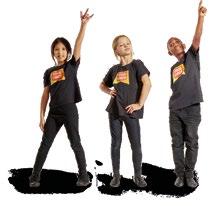
The Fantastic Egg Hunt at Upton Country Park
Find all the eggs and crack the code to receive your fantastic Easter surprise. www.uptoncountrypark.com
Sat 1 to Sun 16 Apr

Family Easter Bushcraft in Swanage Family bushcraft and foraging sessions (min age 4+). £20pp.
Booking required. www.foreadventure.co.uk
Easter Quiz at Wimborne Model Town
Search around the model town buildings and surrounds for clues with small prize. www.wimborne-modeltown.com
Easter Holiday Activities at The Tank Museum
The biggest day out in history with three hundred tanks, explosive live displays, kids’ activities. www.tankmuseum.org
Easter Egg Hunt at Corfe Castle
Use your trail map to locate and complete the dragon’s activities. Includes chocolate egg. £3. www.nationaltrust.org.uk/corfecastle
Easter Craft Shed at Upton Country Park
Drop in and create fantastic paper crafts that celebrate spring. www.uptoncountrypark.com
Easter adventures at Kingston
Lacy
Ten amazing activities to complete before you claim your chocolate egg prize. www.nationaltrust.org.uk/ kingston-lacy
Sun 2 Apr & Sun 9 Apr
The Dinosaur Tram at Seaton Tramway
Adventure-filled tram ride with music, stories, fossil dig and a dinosaur activity. www.tram.co.uk
Smoby Playhouse
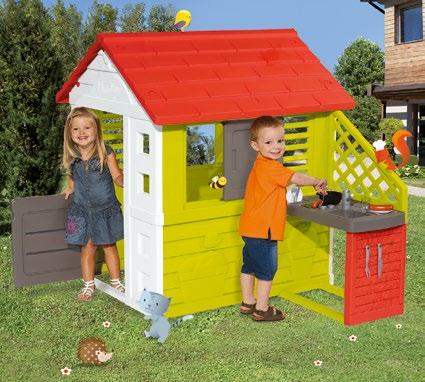
Familiesonline.co.uk Families Dorset 7 Creative Courage For Life® Stagecoach Performing Arts is the trading name of Stagecoach Theatre Arts Limited. Stagecoach Theatre Arts schools are operated under franchise and are independently owned by their Principals. Stagecoach and Creative Courage For Life are registered trademarks of Stagecoach Theatre Arts Limited. Unlock your child’s potential Singing, dancing and acting classes for 4 - 18 year-olds Stagecoach Wimborne and Ringwood St Ives Primary School, BH24 2LE The Allendale Community Centre, BH211AS stagecoach.co.uk/ringwood 01202 238810 T&CsT&Csapply apply Brings creative play to life - indoors and outside!
Playhouse & Kitchen Magazine APPLY at familiesmag.co.uk/go T&Cs apply
available Giveaway!
Smoby Nature
2
WHAT’S ON
Tue 4 Apr
Kid’s Easter Drawing Workshop at Durlston Country Park
Join artist, Mark Page, in the Learning Centre and learn to draw Easter bunnies and hares. Booking required. www.durlston.co.uk
Children’s Swanage Pier History Tour
Learn about pirates, smugglers, sunken treasure and wrecks. www.swanagepiertrust.com
Mon 3 Apr & Mon 2 May
Wildlife Tots at Blashford Lakes Outdoors activities session to explore the reserve. Ages 2-5. www.hiwwt.org.uk/wildlife-tots
Wed 5 Apr
Tremendously Tasty BirdFeeders at Corfe Mullen
Children’s Centre
Make your own birdfeeder and learn about Dorset’s wonderful wildlife. Ages 5-12. FREE. www.bit.ly/DorsetLibraryEvents
Wed 5 & Wed 12 Apr
The Pirate Tram at Seaton Tramway
Set sail on the Seaton Pearl, hoist the Jolly Roger, walk, talk and look like a pirate. www.tram.co.uk
Wed 5 & Wed 12 Apr
Wild Wednesdays at Durlston Country Park
Drop-in craft activities for kids and families, FREE. www.durlston.co.uk

Wed 5 to Wed 12 Apr
Easter at Farmer Palmers Farm Park
Bandit bunnies on the loose, water pistols, tractor rides and more EGG-CITING fun. www.farmerpalmers.co.uk
Thu 6 Apr
Flower Pot Planting for Kids at Durlston Country Park
Join a Ranger, decorate your own plant-pot and plant some seeds. Booking required. www.durlston.co.uk
Fri 7 to Mon 10 Apr
Eggs-travaganza at Monkey
World Ape Rescue Centre
FREE Easter egg trail with chocolate treat and free activity sheet with prize as well as well as 260 rescued and endangered apes and monkeys, three play areas and a woodland walk on offer. www.monkeyworld.org
Easter Egg Hunt at Farmer Palmers Farm Park
Each day, hundreds of minichocolate eggs will be scattered in the special egg-field field as well as twenty five GOLDEN TICKETS to find and exchange for BIG chocolate egg. www.farmerpalmers.co.uk
8 April
Breakfast with the Easter Bunny on Bournemouth Pier
Meet the Easter Bunny and enjoy an all-you-can-eat English breakfast. Children ages 3+ receive an Easter egg from the Easter Bunny, an Easter activity pack, Easter egg hunt, games, treats and activities. 9am to 12pm. Under 3s go free. £22 per person. Book online. www.keywestbournemouth.co.uk
Sat 8 Apr & Sat 15 Apr
The Pirate Tram at Seaton Tramway
Set sail on the Pirate Tram for swashbuckling time, all children to receive some ‘booty. www.tram.co.uk
Sun 9 Apr
Easter Bonnet Parade in Lyme
Regis
Watch the wonderful and extravagant creations parade through the town.
www.lymeregiscarnival.co.uk
Tue 11 Apr
Alice’s Adventures in Easterland at The Barrington Centre, Ferndown Easter Panto EGGstravaganza bursting with fun for all the family. www.barringtoncentre.co.uk
Little Explorer’s Hop into Easter at Museum of East Dorset Easter and Spring themed arts, crafts, stories and trail with prize. £3.50.
www.museumofeastdorset.co.uk
Tue 11 to Thu 13 Apr
Stagecoach ‘Party at the Palace’ Workshop in Ringwood Performing arts fun for ages 4 to 18 at St Ives Primary School. Put on a show in three days including casting, costume and performance. Runs 9.30am to 3.30pm with varied drop off and pick up times between 9am and 4pm possible. 01202 238810 to book or visit website. www.stagecoach.co.uk/ ringwood
Tue 11 to Sun 16 Apr
Tremendous Tree Trail at Upton Country Park
Explore the Trees of Grove Woods and learn about the native and non-native species. www.uptoncountrypark.com
Thu 13 Apr
Let’s Go Fly a Kite for Kids at Durlston Country Park Design and make your own mini-kites, then learn to fly them! Pre-book. www.durlston.co.uk
Recycling Rangers at Sturminster Newton Library Activities to include badge-making and creating grass heads. Ages 4+. www.bit.ly/DorsetLibraryEvents
Thu 20 Apr
TooB at Pavilion Dance South West
A gentle, sensory, enchanting performance for little ones ages 6-24 months and their carers. www.pdsw.org.uk
The Quiet Tram at Seaton Tramway
Sensory-friendly tram trip between Seaton and Colyton. www.tram.co.uk
Sat 22 & Sun 23 Apr
Spring Countryside Show, Shaftesbury
Lots to see and do, tractor rides, blacksmith, falconry, FlyBall and working steam engines. www.steamheritage.co.uk
Mon 1 to Sun 7 May
Coronation Quiz at Wimborne Model Town www.wimborne-modeltown.com
Mon 8 May

Lyme Regis May Fete
A great community fundraising family afternoon. FREE. www.lymeregiscarnival.co.uk
Sat 13 May
The Jurassic Coasts Wild Exhibition Showcasing the wild and wonderful exhibits of ants, invertebrates and much more. www.antsonarock.com
Sat 13 May to Fri 30 June
Swannery Cygnets Hatching at Abbotsbury Swannery
Explore the Swannery and witness the unique sight of the fluffy newly hatched cygnets. www.abbotsburytickets.co.uk
CHILDREN’S THEATRE
BRIDPORT ART CENTRE www.bridport-arts.com
Georgia and the Iceberg Sat 11 Mar
Filled with puppetry, jokes, and a heart-warming original story plus workshop. Ages 7+.
I Spy With My Little Eye – The Party Fri 7 Apr
A terrific treasure hunt, all your favourite sing-along songs and games to play. Ages 2+.
MARINE THEATRE, LYME REGIS www.marinetheatre.com
Mr Magnolia Sat 15 Apr
Colourful characters, live music, puppetry and audience interaction.
LIGHTHOUSE, POOLE www.lighthousepoole.co.uk
The Tap Dancing Mermaid Sat 18 Mar
Featuring stunning puppets, original live music and tap dancing. Ages 3+.
The Tiger Who Came to Tea Tue 4 to Thu 6 Apr
Delightful family show; packed with oodles of magic, sing-a-long songs and clumsy chaos. Ages 3+.
The King of Nothing Tue 11 Apr
This wild new puppet musical sets out to prove… you’ll believe anything. Ages 5+.
High Jinx Thu 13 Apr
Fast paced family show filled with amazing tricks, grand illusions and crazy circus thrills. Ages 4+.

The Munch Mission Sat 22 Apr
A family show full of mystery and quirky comedy. Ages 6+.
TIVOLI THEATRE, WIMBORNE www.tivoliwimborne.co.uk
Mother Goose Sun 16 Apr
Fabulous family pantomime full of your favourite traditions.
WEYMOUTH PAVILLION
www.weymouthpavilion.com
I Spy With My Little Eye – The Party Sun 30 Apr
A terrific treasure hunt, all your favourite sing-along songs and games to play. Ages 2+.
Familiesonline.co.uk Families Dorset 8
and wellbeing for everyone For swimming fun, racket sports, delicious food, kids activities and more. Visit us to find out what's in store. Open every day, find us in Wareham, BH20 4PH 01929 500 000 dorsetcouncil.gov.uk/purbecksportscentre
Fitness
WHAT’S ON





Familiesonline.co.uk Calling parents living in Dorset! Magazine Would you like to try your hand at magazine publishing? Are you interested in media and marketing? Do you think you can grow a business? Come and run Families Dorset magazine! Work part time from home around your family and do something you love. To find out more contact Linda at info@familiesmagazine.co.uk or call 020 8241 0423
Helping boys manage the gender gap
By Catherine Loble and Lisa Wander
A 2022 global report shows that boys are increasingly becoming left behind in education. Furthermore, recent school entry baseline assessments show over one million boys are already under-achieving by the time they enter Reception. So what are the reasons behind this?
One key factor is that the male brain is wired to respond in external, rather than internal ways. This leaves boys at a disadvantage in the school environment where teaching focusses on the sedentary development of verbal skills, at the expense of active learning. A calm, controlled classroom is usually the teacher’s end goal but boys tend to learn better by doing rather than sitting.
Both at home and at school, boys participate less in activities such as storytelling and nursery rhymes that support language and literacy development. Even playtime choices affect their development; whilst girls often use make believe and role play activities which further develop their language skills, boys generally choose more physical outlets.
The gender gap is further evidenced by the fact that boys make up around eighty per cent of pupils excluded from schools. They are often easily distracted and less likely to follow instructions.
What is being done to address this? Sadly, our education system does not always get it right and only a minority of schools have been successful in developing specific strategies to raise boys’ attainment. These involve refining approaches to learning and teaching by challenging stereotypical perceptions and making necessary changes to the curriculum.
An excellent model which proves the theories about the different learning styles needed for successful boys’ education is the rapid emergence of Forest Schools. Here educators are seeing young boys excel when allowed to learn in the right environment, mixing physicality with academia. The benefits are limitless and encourage children of both sexes to learn in their own ways.
While it may not be possible to find or have access to the perfect school environment, acknowledging that boys will mature later and have different learning needs and styles and giving them the encouragement and support they need, will help them progress through the school system. Encouragingly, once they are mature and by the time they finish school, the gender gap will have decreased with boys often outperforming their female counterparts at A-Level.
Catherine and Lisa are co-founders of Emparenting (www.emparenting.co.uk), supporting children, parents and families with insights, skills and tools to nurture the development and well-being of the next generation.
The natural world at Talbot Heath
Teaching children about the natural world is a vital part of their education.
Talbot Heath School in Dorset is situated in the middle of six hectares of pine woodland, giving its pupils the opportunity to explore and connect with nature. Blessed with two Forest School areas, the school uses the main site to run a full Forest School programme for Years 1 to 6 and a smaller Forest School trail which gives Early Years (EYFS) children a sense of the woodland in a secure smaller area.
EYFS children are taken out weekly to explore the woods. They play, climb and make mud cakes. Their natural inquisitiveness is heightened and they begin to develop confidence - trying to walk the slackline, climbing up and down a tree by themselves. They learn through their own play, activities and stories.
Talbot Heath’s Forest School ethos allows children to develop at their own pace, taking on new challenges whilst supported by adults who encourage their independence.

More info at www.talbotheath.org
Emotional intelligence supports learning
Emotional intelligence is defined as a person’s ability to express and manage feelings appropriately, while respecting the feelings of others. Studies show that children with high emotional intelligence gain better grades, stay in school longer and generally make healthier choices. All children can be taught emotional intelligence.

Give feelings a label. Children need to recognise them. This helps build up their own emotional vocabulary when approaching others.
Show empathy. Slow down and be less dismissive of how your kids are feeling.

Model appropriate ways to express feelings. Use feeling words in your everyday conversation.
Teach healthy coping skills. You will find plenty of calming techniques online to show kids how to regulate their feelings. Develop problem-solving skills. Help your children work through problems, don’t simply remove them.
Often all our children need is a hug and an acknowledgement of how they feel!
Familiesonline.co.uk Families Dorset 10 EDUCATION
Stretching your child’s imagination
By Jemma Z Smith
Imagination is the ability to create mental images, thoughts or ideas. It helps us to generate new ideas, to think creatively and to consider possibilities that may not be rooted in current reality. Imagination can be a powerful tool for problem-solving and innovation.
Imagination is often associated with childhood and is an important aspect of child development. Children use their imaginations to create stories, games and other forms of play in which they explore their environment and learn about the world.
However, imagination isn’t only important in childhood. There are many jobs that rely on imagination and creative thinking. For example, imagination is used by the following professionals in the following ways:
Painters, sculptors, photographers - to create works of art;
Novelists, screenwriters and other writers - to create stories and characters;
Actors - to portray characters and bring stories to life;
Architects - to design buildings and other structures; Graphic designers - to create visual designs for websites, advertisements and other media;
Musicians - to compose music and create new sounds; Game designers - to create interactive games and virtual worlds;
Marketers - to come up with creative marketing campaigns and advertisements;
Teachers - to create engaging lesson plans and activities for their students;
Engineers - to design and build new products and systems.
Imagination takes many forms, including visual imagination to create mental images or pictures, verbal imagination in stories or ideas using words and musical imagination creating melodies and harmonies. It can also involve the use of all five senses, such as when someone imagines the taste, smell, or texture of a food they have never experienced.
By providing opportunities for children to use their imagination and encouraging them to be creative, parents can develop their creative thinking skills.
All imaginative play starts with an understanding of the world around us, so to help a child to use their imagination we must first introduce them to different experiences, from sensory experiences such as discovering new foods or smells, to listening to different accents and instruments. This exposure to the world allows your child to have a large mental ‘dressing up box’ to use when creating characters and scenarios for their imaginative play.
Jemma Zoe Smith is Director of The Education Hotel (www.educationhotel.co.uk).
Activities to develop imagination

Encourage open-ended play. Playing with certain toys allows for open-ended exploration and creativity. Blocks, dolls and dressing-up clothes can all be used in a variety of ways, led by a child’s imagination.
Encourage storytelling. Parents can encourage children to create their own stories and characters, either through verbal storytelling, drawing or writing.
Encourage experimentation. Children use their imagination and creativity when trying new things and experimenting with different materials. For example, parents can provide children with art supplies, such as paint, clay or markers and encourage them to create their own projects.
Read together. Reading with children stretches their imagination and exposes them to new ideas and concepts. Encourage them to ask questions and make predictions while reading, to help stimulate their imagination.
Encourage role play. Role play is a fun way to use imagination, for instance, pretending to be a doctor with dolls and soft toys or pretending to be a chef while cooking dinner.

What to do when your child says ‘I’m bored’

Leaving a child to be bored can actually be a good thing; it can help them to develop their imagination and creativity.
When children are not constantly entertained or stimulated by screens or other external sources, they are more likely to turn inward and develop their imagination to create their own fun and entertainment.
It is important therefore to make sure that children have access to a variety of age-appropriate materials and resources that they can dip into anytime to engage their imagination and creativity. Keep a box of ‘prompts’ nearby full of open-ended materials such as art supplies, dressing-up clothes, pieces of old board games, pictures, story books and materials such as pinecones collected on a walk.
By directing your child towards this box of goodies, they will find something to spark their imagination, without being constrained by an existing game, story or role play. This allows them to discover their imaginative process on their own, without input from you.
Familiesonline.co.uk Families Dorset 11 EDUCATION
Six reasons children switch off from learning (and how to re-engage them)
By Gail Hugman
Given eleven years of compulsory full-time schooling, it’s not surprising many children come across difficulties that affect their performance and ability to learn and some switch off learning altogether. The reasons for ‘switching off’ can be many and varied. Here are six of the most common I have come across along with steps which can help children re-engage.

Boredom
It is not uncommon for parents to know intuitively that their child could do much better if they applied themselves. Children need three things to help them do this: to understand how schoolwork helps them develop skills, to know which goal to aim for next and to receive positive praise for small as well as big achievements.

Summer born
Summer born babies are the youngest in their class, which can mean up to eleven months’ less experience of life and development. Being in a group of children who are physically bigger and who know and can do more, can affect confidence and self-belief. Talking to your child about the age difference and what it means can help to keep them engaged.
Learning differences
Sometimes children switch off because they have an undiagnosed learning difference. They get by using coping strategies such as copying friends or telling you they ‘read better in their head,’ to hide their embarrassment. Trust your gut instinct if something doesn’t feel right.
Major events
Separation and divorce, bereavement, moving house, illness and the birth of a sibling all disrupt daily life. It takes three years to recover from a major stress event and we can sometimes forget this in the hurly burly. Having a chat to help settle your child’s mind about the event or remind them how much they’ve achieved or changed can help to ‘update’ their brain and refocus on moving forward.
Not knowing who or how to ask for help
A normally enthusiastic 7-year-old child had become reluctant to go to school and his work was starting to suffer. His teacher and parent both noticed the change. When investigated, it turned out that the boy’s desk had been moved next to the window in class
and he was cold! He didn’t know who to tell. Sometimes the most challenging issues have the simplest solutions. Ask your child what’s going on in school. Don’t overthink it; start simple.
Poor concentration
The possibilities for distraction from learning are numerous. Too much screen time can agitate young developing brains; not enough sleep; not understanding or liking a subject; being too hot, too cold, too hungry or chatting with a friend and missing instructions can all lead to concentration issues. It is more important than ever that your child can focus and concentrate well in the classroom.
How to help
Sit down with your child and ask them what they see as their strengths and what they are proud of, then tell them what you see they have achieved in the last year. Ask them what help they would wish for at school if you had a magic wand. By taking an interest and showing you care, this helps get the discussion started to tease out anything on their mind that you can help with.
Gail Hugman is the bestselling author of 100 Things to Learn
Before You’re 10. A children’s life coach, she owns and runs Human at Core (www.humanatcore.com), which helps parents motivate and engage their children through science-based, online personal development courses.
Concentration skills
Try a daily brain warm up before school with timed, pacy exercises:
Throw ball to wall and catch or throw ball to person – or hand to hand - and catch.
Trace a simple picture or pattern.
Two minutes - repeatedly copy out and say a times table OR write out spellings.

Two minutes – squeeze a stress ball to release tension and develop hand control.
Two minutes - look at timetable for the day to get the brain ready.
Working memory
Working memory and processing issues are not a measure of intelligence but they slow children down. The good news is children can improve with help. Try these simple daily activities for working memory issues:
Read homework to your child.
Show your child what to do first, what to do second etc and look at each step when finished.
Help your child read often to boost confidence. Play memory games frequently.
Familiesonline.co.uk Families Dorset 12 EDUCATION
What NOT to say to a child with ADHD
By Sarah Templeton
ADHD, or ‘attention deficit hyperactivity disorder’ to give its full name, is a neurodiverse condition that some people are born with and have for life. It is not a childhood behavioural disorder and has nothing to do with E numbers, bad parenting or just being naughty. In an MRI scan, it is now possible to see the difference between a neurotypical brain and a neurodiverse brain.
Children who are born with neurodiverse brain wiring have as much right to be their authentic selves as those born with neurotypical brains.
However, ADHD children are known to receive approximately twenty thousand negative messages before they reach age 12. This indicates that we grossly misunderstand them. How can we address this?
The main thing not to say to any ADHD child is anything critical of their natural, inbuilt behaviours. This could include their hyperactivity, restlessness, inattentiveness, distractedness and their impulsive and compulsive behaviours.
It is very important we see ADHD as the way a child’s brain functions and work with their traits, rather than fighting them. You are never going to knock the ADHD out of a child or send them to therapy and get a neurotypical child back. It is kinder and more effective to understand all the traits of ADHD and embrace them positively instead.
ADHD brains are different!
ADHD brains have specific ways of thinking. Some of these might shock you but they are all true.
Kids with ADHD are wired to think they know best, want everything their own way, think they are right about everything, dislike authority or being told what to do and push boundaries at every opportunity.
The biggest trait of all is emotional dysregulation which is the element of the brain that is supposed to regulate emotion malfunctions. This is when you get angry kids having meltdowns or kicking-off or weepy, overly emotional kids; they are unable to regulate their emotions. So, another thing not to say to a child with ADHD is anything about ‘being unable to control their temper’ or ‘being overly sensitive.’ They really can’t help this either.
ADHD kids also have a heightened sense of justice so are very hot on things being fair and equal. Again, respect their opinions and don’t dismiss their feelings.
Sarah Templeton is an ADHD counsellor, coach, CBT therapist and author of How Not to Murder Your ADHD Kid, available through good bookshops and at her website www.sarahtempleton.org.uk
ADHD and self-esteem
It is now accepted that not being able to control emotions is the most difficult element of ADHD.

In addition, those with ADHD also have ‘rejection sensitive dysphoria’ which is largely accepted to relate only to ADHD people. It means ADHD kids will take rejection and particularly humiliation very badly. Be mindful of how you speak to an ADHD child as even your tone of voice can make them feel hurt, rejected and undermine their self-esteem.
However frustrated you are feeling, try never to snap at your child. Remember, whatever they have just said or done to irritate you is no doubt just their natural ADHD brain’s way.
Try and speak to your child with respect, give them options wherever possible, so they feel they are in charge and not being told what to do and always make sure they feel listened to and heard.
An ADHD child will get more frustrated than most if they feel they aren’t being taken seriously and this can begin from the age of 3 upwards.

ADHD and learning
School can be difficult for ADHD kids. Long lessons with little activity can bore them. Teachers who don’t teach in an engaging way won’t stimulate their brains and they will never be equally interested in all subjects.
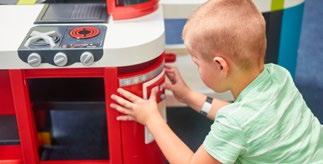
You can expect your child to do very well in some classes and not so well in others. This isn’t because they aren’t trying; it’s just their brain is not being stimulated enough to concentrate on that subject.
Revision is also hard. Doing anything for a second time is never going to stimulate an ADHD brain. So rather than expecting your child to read and absorb words for hours and for that to sink in, be creative with your revision plans.
Grab their attention with visits to interactive museums or to theatres or cinemas to see live or screened versions of any plays or books they are studying.
As a way of stimulating their brains to learn and retain information, try testing them in fun quizzes on topics they need to learn, with rewards on offer!
Familiesonline.co.uk Families Dorset 13
PARENTING
Bringing back playing out
For the majority of today’s parents, the best childhood memories don’t involve expensive toys or organised activities. Instead, they remember the simple pleasures of playing and running around outside with their friends. Their strongest and fondest memories recall a magical sense of freedom and possibility.
There have been many studies into the benefits of free, unstructured outside play. Children playing together use their creativity and imagination to create games and invent rules; they learn how to collaborate, share, negotiate and resolve conflicts. They build resilience, independence and social confidence as they learn to navigate the world without adult interference. All valuable experiences as they grow into young adults.
Playing outside is also the natural, joyful way that children are physically active and develop running, balancing, skipping, climbing, jumping and even ball skills at their own pace. You don’t have to ‘make’ children do this; just look at a school playground at breaktime!
In the past, playing outside was the easy, free way that children got all these vital health and wellbeing benefits, every day. All it needed was safe spaces close to home: streets, patches of land, small parks children could get to. It didn’t need money, a car or an adult to take them.
Today things are very different. While screens and ‘lazy’ children or parents often get blamed, one of the biggest barriers is traffic. UK traffic volume has doubled since the 1980s and roads are now seen as ‘just for cars.’ Parental fears are justified, as the numbers of children being killed or injured on our roads is shocking and should be unacceptable in any society.
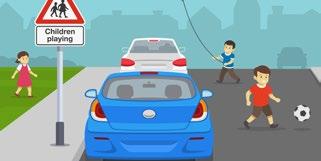
So what can parents do?
Gardens are safe but not everyone has one. Organised activities are great but not always possible and don’t replace the benefits of unstructured play.
Play streets are one way to reclaim some of the freedom children have lost. By temporarily stopping through traffic on a residential street, neighbours can open up a safe space for children to play together on their doorsteps.
In 2009, a group of Bristol parents closed their street to through traffic for a few hours to give their children some of the freedom they grew up with. Their council then agreed that this could happen every week. The idea began to spread and they set up Playing Out to support other parents and residents do the same.

Playing Out brings more play and freedom into children’s lives in an easy, affordable way. Look into setting up your own space at www.playingout.net.
Children’s health and community Getting started with play streets

Play streets have been spreading across the UK for over a decade now and the positive impact on children is backed up by research: regular extra hours of physical activity, the opportunity to make friends with other neighbourhood children and picking up fun and useful skills such as skipping and riding bikes. In short, all the good benefits of playing out for health and wellbeing that many of us used to have.
Many streets which have been playing out regularly for several years have found that it’s not just the children who benefit; it can bring the whole street community together. Everyone on the street is invited to join in, whether they have children or not.
Friendships between neighbours are formed or strengthened, while older residents often feel less lonely. When Covid left some elderly or unwell people feeling isolated, those living on play streets found that they already had a support network of friends and neighbours on their street.
Play streets aren’t just for children, they’re for everyone on the street!
There are four steps involved with setting up a play street: Consult your neighbours. It’s clearly got to be something that they will either actively embrace or, at the very least, find acceptable.
Apply to your council for permission. Not all councils have policies to support play streets but they can often be persuaded if they can see that there is demand from residents. In these areas, why not start with a street party (for the Coronation perhaps), focus on low key space for play and then take it from there?
Effectively communicate what is happening to everyone on the street.
Release your kids to play out. On the day, volunteer stewards supervise the road closure so that residents who need to can still drive in and out and the disruption to neighbours is minimal. All the information and support you need to take this further is at www.playingout.net
Familiesonline.co.uk Families
14 OUTDOORS
Dorset
Secrets of our first thousand days
By Professor Lucy Green & Professor Mark Hanson

Have you ever wondered why keeping healthy is so tough for some of us but seems easy for others? And why the so-called ‘non-communicable’ diseases like cardiovascular disease and diabetes still account for most deaths around the world, despite all the efforts of doctors and health care systems? Did you know that unconscious communication with your baby in the womb helps their body’s control systems develop for lifelong health?
An increasing number of medical experts would say that we are missing a fundamental clue to what makes us healthy. Our lifelong risk of chronic diseases can be established during our first thousand days, from conception until age two. This critical time affects how our bodies are put together and how we will respond to the world we will live in, with its stresses, need for exercise and good diet, adequate sleep and healthy behaviours.
The secrets of the first thousand days of our lives start from the moment of conception. Once the egg and sperm have fused, the very early embryo begins ‘tasting’ its environment. It detects signals about the world from the mother’s hormones and the nutrients from the food she eats. These leave small ‘epigenic’ marks on the embryo’s DNA. It’s not just about the mother; the father’s sperm brings the egg its own marks too, affected by his diet and lifestyle. These change the instructions given by the inherited genes and can change how the unborn baby develops.
As the foetus grows it senses more signals from the mother’s lifestyle and nutrition. This is important because some organs developed before birth must serve us for a lifetime, like the muscle cells in our hearts and the filtering units in our kidneys. We even started practising breathing, albeit underwater, inside the womb and our lungs are sensitive to cues from our mother. Scientific advances reveal even more surprises; for example, that foetal brain electrical activity looks like adult sleep states. Could the foetus even be dreaming?
Children continue to respond to care and signals from the environment as they achieve major milestones before the age of 2, such as eating solid food, speaking their first words and taking first steps unaided. Some developments are less visible, like colonisation of the gut with bacteria, building an immune system based on ‘experience,’ or the changes in nerve cells and connections within the brain as they learn to recognise new faces and voices.
We are quite used to checking our children’s growth from the moment of birth. It is particularly important because poor foetal growth is associated with greater risk of non-communicable diseases later in life and small babies sometimes struggle to thrive. In addition, more young people than ever are overweight or obese and this risk of poor overall health can pass across generations too.
Knowing the secrets of development and how they can affect risks of ill-health later in life makes us think: if all parents were better prepared before pregnancy they would give the best first thousand days to the next generation. Our children won’t remember it or grow up to thank us but they’ll stay healthier.


Mark and Lucy, both at the University of Southampton, have spent decades researching the processes underlying human early development, which are now published in their new book What Makes a Person: Secrets of Our First 1,000 Days, available from www.bookshop.org.
The best start in life
For every couple, the time period during which preparation is needed for the first thousand days of their child’s life is quite short. It’s likely to be three to six months before conception and, at this point, societal and healthcare support needs to be in place.
We also need to think about what support couples might need during this vital time window. This will help in persuading healthcare professionals and political decision-makers to provide such help as they plan healthcare strategies for our future.
What Makes a Person
The achievements of biomedical research over recent decades have made it clear that while genes are the tools which our bodies use to develop, the plan of how we each develop and the use of the tools to do the job, is very flexible. The messages about life received from our parents sets the course of development.

What Makes a Person: Secrets of Our First 1,000 Days reveals less obvious and well-known scientific ‘secrets’ of development in the womb and early childhood.

Familiesonline.co.uk Families Dorset 15 EARLY YEARS
Get our digital mag! IT’S FREE!
Let’s make a spring bird café!
Celebrate the arrival of spring by making this funky spring bird café from our friends at Wonderbly. It’s great for small fans of nature and you get to feed the local bird population at the same time.
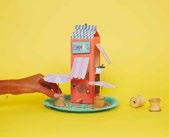
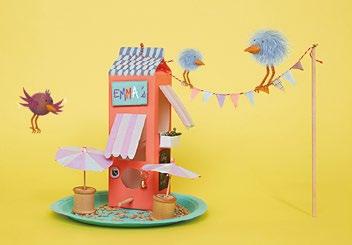
You will need:
• Milk carton
• Paper plate
• Pencil
• Ruler
• Scissors or Stanley knife (for adults only)
• Paint (use acrylic paint if you want your bird café to go outside but make sure you wear an overall or apron as it doesn’t wash out!)
• Decorative tape (optional)
• Bobbins and mini umbrellas

• Dowel or BBQ sticks

• Yummy seeds
• Flappy customers!
andCutout Keep &
Step 1:
Grab your (empty) milk carton. Take your ruler and get your child assistant to measure and trace two flaps for awnings and a hole for the birds. Then cut the holes.

Step 5:
While you’re doing the fiddly bits, let your child make their café’s sign with some cardboard and paint. Leave to dry and then help the café owner write their name with a marker before you cut and glue it.


Step 2:
Paint the milk carton and paper plate to make your building and outdoor area. For sharper colour, give your milk carton two coats.
Step 6:
Almost time for the grand opening. Get the kids to stock the café with seeds. Birds especially love sunflower seeds and peanuts.
Step 3:
Tile your roof by painting tiles on with the brush and adorn your awnings. We used decorative tape but you can paint or colour in with pens and pencils.
Step 4:
Make some bunting using thread and decorative tape. You can even make a window plant box by folding up some paper and gluing it underneath one of the awnings.
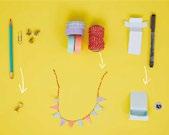
Wonderbly creates beautiful, personalised children’s books that inspire courage, curiosity, and kindness in children all over the world. A treat for any curious little mind.
www.wonderbly.com
Step 7:
Nearly ready! Grown-ups, make a little ‘X’ with the Stanley knife below the seed hole and push a piece of dowel or a cocktail stick through. Finally, pop some tables and parasols outside for your first customers. Bobbins and mini umbrellas are perfect for this, or you could use corks and leaves if you want more plants.
Instructions: &
Familiesonline.co.uk Families Dorset 16


























































































